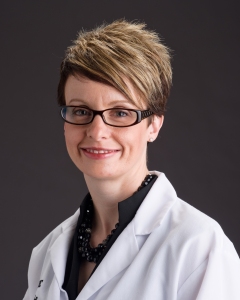 University of Missouri Assistant Professor of Medicine Renee Sullivan is an expert on heart disease. Here, she shares some information about preventing heart disease and getting treatment.
University of Missouri Assistant Professor of Medicine Renee Sullivan is an expert on heart disease. Here, she shares some information about preventing heart disease and getting treatment.
Q: Heart disease is the No. 1 killer of American women. What simple steps can women and men take to prevent heart disease?
A: The most important thing women and men can do to prevent heart disease is to know their risks and take steps to treat the contributing conditions. This means women and men should know if they have diabetes (high blood sugar levels), high cholesterol, or high blood pressure and if they do, should have these conditions treated. It is important to maintain a healthy weight and eat heart healthy foods. Exercise is also important and if you are considering starting to exercise, you should talk with your doctor to make sure you are healthy enought to start. Finally, if you smoke, you should stop or just never start in the fist place!
Q:Black women are more likely to die of heart disease than women of other races. What are the risk factors that especially affect African American women?
A:The biggest factors that seem to affect the risk of heart disease in African American women are having high blood pressure, being overweight or obese, and having diabetes. These are all treatable conditions so it is important that all women (and men) seek medical care to lower the risk of developing heart disease.
Q: It’s said that women who experience heart attacks delay treatment because they’re so busy or don’t think it’s a big deal. How do the signs of a heart attack differ for women and men, and why is it important to act quickly after suffering the symptoms?
A: Getting care quickly after someone has symptoms of a heart attack is important because time is muscle. The longer someone waits to get care, the more likely there is to be permanent heart damage. We commonly think of a heart attack when someone has crushing pain in the chest, but that doesn’t always happen in women. Sometimes women have minor pain in the chest or back or have pain in the abdomen. Women may also feel short of breath, have sweating or nausea and vomiting. Sometimes women may feel lightheaded or just feel more tired than usual.
Q: How can I help teach my kids, family members or friends to be heart-healthy without scaring them?
A: I think the best way to teach your family and friends to be heart healthy without scaring them is to lead by example. Eat heart healthy foods like fruits and vegetables. Cut out the fast food, chips, soda, etc. Also, try to exercise at least 30 minutes on most days of the week. The simple changes you make in your lifestyle will encourage your friends and family to make similar changes and kids tend to learn by what they see their parents doing.
Q: What should people diagnosed with heart disease or who’ve had a heart attack do to lower their risk?
A: If someone has been diagnosed with heart disease or has had a heart attack they need to do everything in their power to prevent progression of the disease or prevent another heart attack. First, follow the advice of your doctor and make sure you take any medications you are prescribed. Beyond that, do the simple steps we have talked about before- treat high blood pressure, diabetes, high cholesterol. Eat healthy foods like fruits and vegetables. Exercise and maintain a healthy weight. If you smoke, pick a date to stop!
Q: Are there any resources you recommend to learn more about my risk for heart disease? T
A: here are some great websites from the American Heart Association where you can learn about heart disease:
http://www.nhlbi.nih.gov/educational/hearttruth/downloads/pdf/factsheet-actionplan-aa.pdf
Also, the University of Missouri Health Care Heart Month website at http://www.muhealth.org/heartmonth has some great information about decreasing your risk of heart disease.
Leave a comment